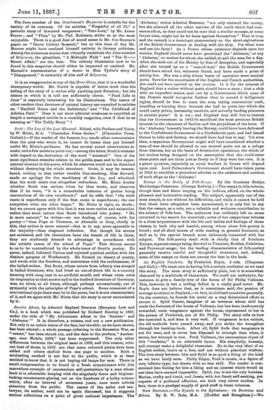An English Vendetta. By Frederick Boyle. 3 vole. (Chapman and
Hall.)—We must own to having felt a certain confusion as we read this story. The main story is sufficiently plain, but it is somewhat obscured by a multitude of characters. We could not undertake, for instance, to give a family-tree of the house of Sir Philip Valiance. This, however, is bat a trifling defect in a really good novel. Mr. Boyle does not believe that, as is sometimes said, the passion of revenge is extinct in England,—in fact, in civilised countries generally. On the contrary, he founds his novel on a very determined effort to secure it. Sybil Farrar, daughter of an inventor whose skill has made the fortunes of the house of Valiance, but has been inadequately rewarded, vows vengeance against the house, represented to her in the person of Frederick, son of Sir Philip. The story tells us hew she executed it, and does it very well. If vengeance is not extinct, the old methods have passed away, and you strike the wrongdoer through his banking-book. After all, Sybil finds that vengeance is not for man, and is never lees disposed to triumph than when, it seems, her triamph is won. Fred. Valiance, the unconscious object of this " vendetta," is an admirable figure. His simplicity, honesty, and courage make a delightful character. He is the very ideal of an English soldier, brave OE a lion, and not without practical wisdom. The love-story between him and Sybil is as good a thing of the kind as we have lately seen. Philip Edgar, Prod.'s cousin, is a figure of very inferior type, but drawn with no less skill. The reader is eon. strained into feeling for him a liking and an interest whioh would at one time have seemed impossible. Sybil, too, is not the only heroine. Mariam crafty and timid, and Jessie, with her frank self-seeking, yet capable of a profound affection, are both very clever studies. In feet, there is a prodigal supply of good stuff in these volumes.


































 Previous page
Previous page